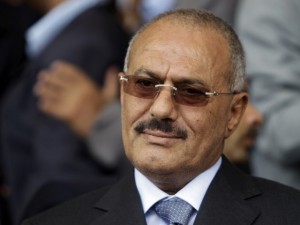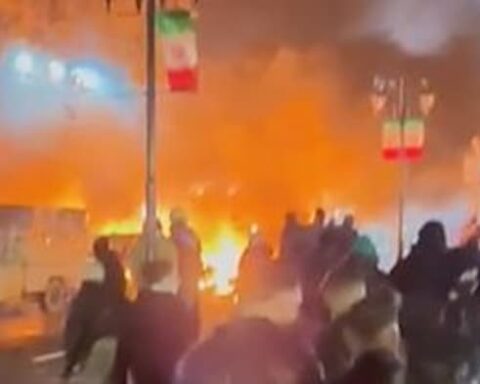The murder of former Yemen president Ali Abdullah Saleh by Houthi rebels will simply guarantee continued and intensified attacks by the Saudi-led coalition that has been bombing Yemen since March 2015.
By Sunday, Houthi fighters had taken control of most of the capital, Sanaa, with intense battles going on in the city.
Saudi airstrikes didn’t prevent the Houthi fighters from reaching former President Saleh’s own home on Monday. Shortly after this, the reports began to circulate that he had been murdered, with some versions of the story claiming he had been taken out of the vehicle he had attempted to flee in and summarily executed by Houthi fighers acting no better than Al-Qaeda fighters or jihadists.
The unsettling footage circulating on the Internet and some news channels appeared to show Saleh’s body – with a bullet-wound to the head – being paraded around in the open back of a truck (I preferred not to show it here, but it’s here if anyone wants to see it).
His murder, as has been noted elsewhere, is eerily reminiscent of the brutal murder of Muammar Gaddafi in October 2011.
The Gaddafi comparison arguably goes even further than just the grim manner of death.
Ali Abdullah Saleh, like Gaddafi, had been leader in his country for decades. And, like Gaddafi, he was a victim of the so-called ‘Arab Spring’, which was what forced him from power a few years ago. Also like Gaddafi in Libya, Saleh was considered by all to be a master at maintaining relationships with all the various tribes in Yemen. As in Libya and a number of other Arab countries, the tribal make-up in Yemen is a delicate thing, and not just anyone can effectively deal with that system or know how to keep everything together.
Saleh has been regarded as a very effective deal-maker in his relationships with Yemen’s tribal interests, which is one of the reasons he was able to stay in power for so long. For many years, he was able to hold the impoverished country together, preventing tribal conflicts from erupting or spilling out of control.
That Saleh was guilty of corruption isn’t argued: but he was by no means the most corrupt leader in a region ruled almost exclusively by dictators or by corrupt regimes (some of them being Western-backed regimes, others not).
Nevertheless, despite his decades in power, the Arab Spring protests were the beginning of his downfall.
But a number of Arab commentators have argued that the fact Saleh still remained in the picture as a key player even after the Arab Spring and his dismissal is proof of how important a figure he was in Yemen: a figure with decades’ worth of relationship-building and influence all across the country.
That is a person it is very difficult to replace or replicate, as has been found in post-Gaddafi Libya.
The irony of his death is that his murderers – the Houthis (a Shia militia allegedly backed by Iran) – were the same people he had been in alliance with against the Saudis and their preferred Yemeni leader.
Up until just a few days ago, were he to have been killed it would’ve been at the hands of the Saudi-led coalition. But Saleh’s apparent decision to try to enter a diplomatic solution with the Saudis and their coalition was – according to most reports – what caused the Houthis to kill him and then boast about it.
While many question Saleh’s decision to enter an alliance with the Houthis in the first place, it was arguably in his long-standing nature as a deal-maker who repeatedly sought alliances with different tribes or factions.
He also must’ve seen the Houthis as a valuable alliance in terms of fighting Al-Qaeda. According to Foreign Policy, Saleh – like Gaddafi in Libya – had been so successful at combating Al-Qaeda that ‘Washington’s priority in Yemen shifted from counter-terrorism to promoting democracy.’
Washington may have therefore been complicit in Saleh’s downfall during the Arab Spring, despite Saleh being an effective ally in the Bush regime’s so-called War on Terror.
His decision to abandon the Houthis and seek a diplomatic rapproachment with the Saudis might’ve been borne out of some kind of self-interest: but it also may have simply been a case of Saleh seeing no other solution to the crisis in Yemen.
With the Saudi bombing of Yemen – along with the enormous humanitarian crisis – having gone on now for over two years, Saleh, arguably, simply saw that it was time to end the devastation; and seeing the Houthis as both a lost cause and a total no-go for the Saudis, he may have seen no other choice but seeking an arrangement with the Saudis to bring about an end to all the bombing.

Many commentators now say the Houthis’ decision to murder him has effectively destroyed any possibility they had of any kind of long-term victory; as he was their only possibility for any kind of legitimacy in Yemen.
Instead, with his blood on their hands, they may in fact unite the majority of the country against them more fully.
What’s clear is that the situation in Yemen is not going to improve; and there will be no relenting from the Saudi coalition while the Houthis are still fighting on. Which means, as usual, it is the people – including scores and scores of starving, ill or malnourished children – who will continue to suffer, caught in the middle.
__________________________




